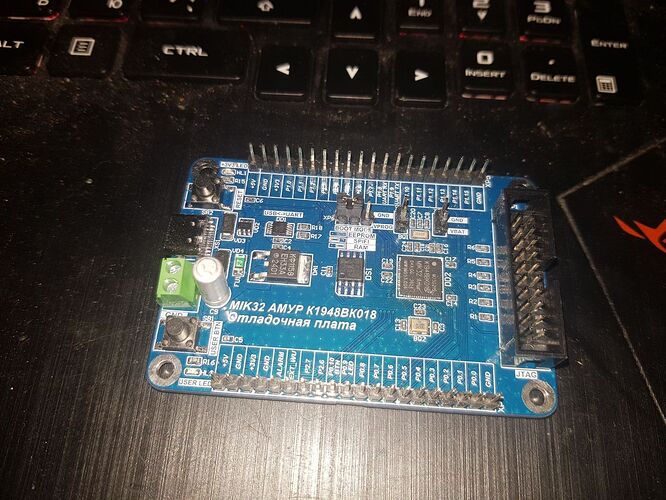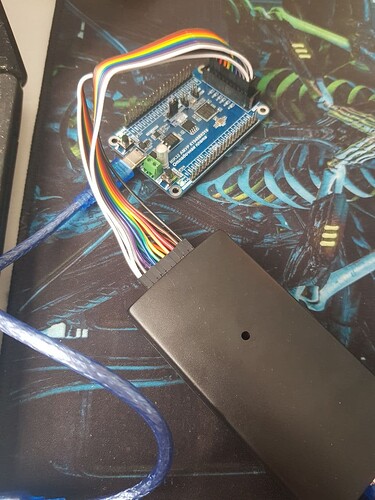Есть только MIK (32) между прошлым и будущим. Есть только MIK (32) за него и держись ))))
если будут на покупку каждой платы финансировать покупающего по 7 тыщ. (чтобы производство поднять) то почему нет, наработки пойдут, я бы пяток прикупил
Т.е. остаток 800 руб от продажной цены, ты готов, как патриот, всё же потратить на приобретение данной платы?
а почему нет, это так сказать моя доля в развитии отечественной микроэлектроники
Во сколько обошлась платка?
Эти разьёмы, в своё время, были скуплены людьми известной национальности при подходе к радиорынкам с обращением Жёльтый ест ))))
Московские хипстеры наиграются, будут по тыще на авито скидывать. Подождем…
Оригинальный Arduino Uno Rev3 30 евро стоит. А тут ведь не какая-то Атмега, а целый Амур! ![]()
Надо поддержку в Ардуино ИДЕ пилить, раз уж в таком формфакторе сделали. Или уже есть?
делается/тестируется уже.
ты как в воду смотрел ![]()
![]()
В сентябре все дети идут в школу) И именно сегодня, 3-го сентября, у наших детей
наконец-то появилась возможность применять платы ELBEAR ACE-UNO российской
разработки и производства во всемирно известной экосистеме Arduino IDE.
Представляем Вашему вниманию бета-версию Board Support Package (BSP) для Arduino
IDE для плат ELBEAR ACE-UNO! Инструкция по активации BSP на странице поддержки
elron.tech/support/#elbear. Все исходники BSP выложены на российском репозитории
GitFlic https://gitflic.ru/project/elron-tech/elbear_arduino_bsp. Пользуйтесь, и творите вместе
с нами!
не густо:
Спойлер
#ifndef Pins_Arduino_h
#define Pins_Arduino_h
#ifdef __cplusplus
extern "C" {
#endif
#include "mik32_hal_gpio.h"
#include "mik32_hal_timer32.h"
#include "wiring_constants.h"
extern bool spiNssPinIsBlocked;
// analog pins
#define PIN_A0 (14)
#define PIN_A1 (15)
#define PIN_A2 (16)
#define PIN_A3 (17)
// there are D18 and D19 between them
#define PIN_A4 (20)
#define PIN_A5 (21)
static const uint8_t A0 = PIN_A0;
static const uint8_t A1 = PIN_A1;
static const uint8_t A2 = PIN_A2;
static const uint8_t A3 = PIN_A3;
static const uint8_t A4 = PIN_A4;
static const uint8_t A5 = PIN_A5;
// digital pins
// D0...D13, D18, D19
// User led and button
#define LED_BUILTIN (22)
#define BTN_BUILTIN (23)
// determines the address of the port by the board pin number to which this pin belongs on the MCU
GPIO_TypeDef* digitalPinToPort(uint32_t digPinNumber);
// determines the pin address inside the port by the board pin number
HAL_PinsTypeDef digitalPinToBitMask(uint32_t digPinNumber);
// total number of pins available for initialization
uint16_t pinCommonQty(void);
// the function returns a reference to the OUTPUT address of the GPIO register
volatile uint32_t* portOutputRegister(GPIO_TypeDef* GPIO_x);
// the function returns a reference to the STATE address of the GPIO register
volatile uint32_t* portInputRegister(GPIO_TypeDef* GPIO_x);
// ADC
// determines the ADC channel number by the board pin number
uint32_t analogInputToChannelNumber(uint32_t PinNumber);
// PWM
bool digitalPinHasPWM(uint8_t p);
// determines which timer the pin belongs to
TIMER32_TypeDef* pwmPinToTimer(uint32_t digPinNumber);
// determines which timer channel the pin belongs to
HAL_TIMER32_CHANNEL_IndexTypeDef pwmPinToTimerChannel(uint32_t digPinNumber);
// SPI
#define PIN_SPI_SS (10)
#define PIN_SPI_MOSI (11)
#define PIN_SPI_MISO (12)
#define PIN_SPI_SCK (13)
static const uint8_t SS = PIN_SPI_SS;
static const uint8_t MOSI = PIN_SPI_MOSI;
static const uint8_t MISO = PIN_SPI_MISO;
static const uint8_t SCK = PIN_SPI_SCK;
// config SEL_NSS1 to replace D10 to different controller pin,
// because pin 1.3 which is D10 by default is needed to spi
inline void blockSpiPin(void)
{
spiNssPinIsBlocked = true;
}
inline void unblockSpiPin(void)
{
spiNssPinIsBlocked = false;
}
// I2C
#define PIN_WIRE_SDA (18)
#define PIN_WIRE_SCL (19)
#define I2C_NUM (1) // i2c number 0 or 1
static const uint8_t SDA = PIN_WIRE_SDA;
static const uint8_t SCL = PIN_WIRE_SCL;
// available frequencies
#define WIRE_FREQ_100K 100000
#define WIRE_FREQ_400K 400000
#define WIRE_FREQ_1000K 1000000
// interrupts
// determines the board pin number by interrupt number
uint32_t interruptToDigitalPin(uint8_t interruptNum);
// determines interrupt number by the board pin number
int8_t digitalPinToInterrupt(uint32_t digPinNumber);
// determines gpio interrupt line by interrupt number
uint32_t interruptToGpioIntLine(uint8_t interruptNum);
// determines interrupt number by the gpio interrupt line
int8_t gpioIntLineToInterrupt(uint32_t gpioIntLine);
// determines gpio interrupt mux by interrupt number
uint32_t interruptToGpioIntMux(uint8_t interruptNum);
#ifdef __cplusplus
}
#endif
#endif
запустил пример Adafruit на MIK32
Отлично!!!
Какая частота i2c ?




